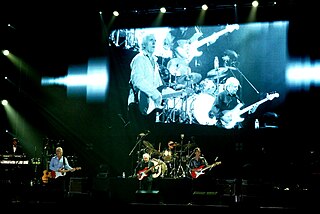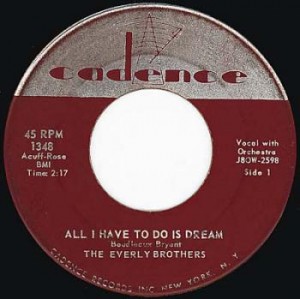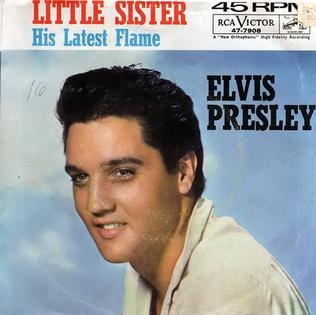Related Research Articles

"Whole Lotta Love" is a song by the English rock band Led Zeppelin. It is the opening track on the band's second album, Led Zeppelin II, and was released in the United States, several countries in Europe, and Japan as a single; as with other Led Zeppelin songs, no single was released in the United Kingdom. The US release became their first hit single, being certified Gold on 13 April 1970, having sold one million copies. It reached number one in Australia and Germany and number four in the Netherlands and the United States. Parts of the song were adapted from Willie Dixon's "You Need Love", recorded by Muddy Waters in 1962; originally uncredited to Dixon, a lawsuit in 1985 was settled with a payment to Dixon and credit on subsequent releases.

Thomas Jefferson Edwards was an American singer and songwriter. His most successful record was the multi-million-selling song "It's All in the Game".

Floyd Cramer was an American Hall of Fame pianist who was one of the architects of the Nashville sound. He was known for his "slip note" piano style, in which an out-of-key note slides into the correct note.

The Shadows are an English instrumental rock group. They are Cliff Richard's backing band from 1958 to 1968 and on numerous reunion tours, including 2020. The Shadows have had 69 UK chart singles from the 1950s to the 2000s, 35 credited to the Shadows and 34 to Cliff Richard and the Shadows. The group, who were in the forefront of the UK beat-group boom, were the first backing band to emerge as stars. As pioneers of the four-member instrumental format, the band consisted of lead guitar, rhythm guitar, bass guitar and drums. Their range covers pop, rock, surf rock and ballads with a jazz influence.

"I Can't Stop Loving You" is a popular song written and composed by country singer, songwriter, and musician Don Gibson, who first recorded it on December 30, 1957, for RCA Victor Records. It was released in 1958 as the B-side of "Oh, Lonesome Me", becoming a double-sided country hit single. At the time of Gibson's death in 2003, the song had been recorded by more than 700 artists.
"On the Street Where You Live" is a song with music by Frederick Loewe and lyrics by Alan Jay Lerner from the 1956 Broadway musical My Fair Lady. It is sung in the musical by the character Freddy Eynsford-Hill, who was portrayed by John Michael King in the original production. In the 1964 film version, it was sung by Bill Shirley, dubbing for actor Jeremy Brett.

"Who's Sorry Now?" is a popular song with music written by Ted Snyder and lyrics by Bert Kalmar and Harry Ruby. It was published in 1923, when Isham Jones took it to number three. Other popular versions in 1923 were by Marion Harris, Original Memphis Five, Lewis James, and Irving Kaufman.

"All I Have to Do Is Dream" is a song made famous by the Everly Brothers, written by Boudleaux Bryant of the husband and wife songwriting team Felice and Boudleaux Bryant, and published in 1958. The song is ranked No. 141 on the Rolling Stone magazine's list of The 500 Greatest Songs of All Time. The song is in AABA form.
Marvin Karlton Rainwater was an American country and rockabilly singer and songwriter who had several hits during the late 1950s, including "Gonna Find Me a Bluebird" and "Whole Lotta Woman", which hit #1 on the UK Singles Chart. He was known for wearing Native American-themed outfits on stage and claimed to have quarter-blood Cherokee ancestry.
"It's All in the Game" is a pop song whose most successful version was recorded by Tommy Edwards in 1958. Carl Sigman composed the lyrics in 1951 to a wordless 1911 composition titled "Melody in A Major", written by Charles G. Dawes, who was later Vice President of the United States under Calvin Coolidge. It is the only No. 1 single in the U.S. to have been co-written by a U.S. Vice President or a Nobel Peace Prize laureate.

"It's Only Make Believe" is a song written by drummer Jack Nance and Mississippi-born singer Conway Twitty, while both were touring across Ontario, Canada in 1958. The song was recorded on May 7 for MGM Records; produced by Jim Vienneau, it featured Floyd “Lightnin’” Chance on double bass. It was released on side B of "I'll Try" on July 14, 1958. Known as Harold Lloyd Jenkins until changing his name in 1957, Twitty was a relatively unknown rock n' roll singer at the time. That all changed when side B finally hit the chart in September, then made no. 1 twice, on November 10 and 24. The single topped both U.S. and the UK Singles Chart, and became the only #1 pop single of his career. Years later, on a segment of 'Pop Goes The Country', Twitty stated it was a hit in 22 different countries, and sold over 8 million copies. He did not become a country music star until he crossed over in 1966.
"Running Bear" is a song written by Jiles Perry Richardson and sung most famously by Johnny Preston in 1959. The 1959 recording featured background vocals by Richardson, George Jones, and the session's producer Bill Hall, who provided the "Indian chanting" of "uga-uga" during the three verses, as well as the "Indian war cries" at the start and end of the record. It was No. 1 for three weeks in January 1960 on the Billboard Hot 100 in the United States. The song also reached No. 1 in the UK Singles Chart and New Zealand in 1960. Coincidentally, "Running Bear" was immediately preceded in the Hot 100 No. 1 position by Marty Robbins' "El Paso", another song in which the protagonist dies. Billboard ranked "Running Bear" as the No. 4 song of 1960.

"Indian Reservation " is a song written by John D. Loudermilk. It was first recorded by Marvin Rainwater in 1959 and released on MGM as "The Pale Faced Indian", but that release went unnoticed. The first hit version was a 1968 recording by Don Fardon – a former member of the Sorrows – that reached number 20 on the Hot 100 in 1968 and number 3 on the UK Singles Chart in 1970.

Sandy Posey is an American popular singer who enjoyed success in the 1960s with singles such as her 1966 recording of Martha Sharpe's compositions "Born a Woman" and "Single Girl". She is often described as a country singer, although, like Skeeter Davis, her output has varied. Later in her career, the term "countrypolitan", associated with the "Nashville sound", was sometimes applied. Posey had four hit singles in the United States, three of which peaked at number 12 on the Hot 100.

"Dance On!" is an instrumental by the British instrumental group, the Shadows. It went to number 1 in the UK Singles Chart and the Irish Singles Chart. A vocal version, with lyrics by Marcel Stellman, was recorded by British female vocalist Kathy Kirby, whose version reached number 11 in the UK chart in September 1963.
"Wonderful Land" is an instrumental piece written by Jerry Lordan recorded and released as a single by the Shadows in 1962. It stayed at No. 1 for eight weeks in the UK Singles Chart.

"Little Sister" is a rock and roll song written by Doc Pomus and Mort Shuman. It was originally released as a single in 1961 by American singer Elvis Presley, who enjoyed a No. 5 hit with it on the Billboard Hot 100. The single also reached No. 1 in the UK Singles Chart. Lead guitar was played by Hank Garland, with backing vocals by the Jordanaires featuring the distinctive bass voice of Ray Walker.
Goldbug were a British band in the 1990s. The band were formed in Brighton in 1995 by a former member of the Beatmasters, Richard Walmsley, drummer Tony Horkins and DJ Adil Magik, with a session vocalist, Sandy McKenzie, who was recruited through an advertisement in Melody Maker.

Brenda, That's All is the seventh studio album by American pop and country artist Brenda Lee. The album was released October 15, 1962 on Decca Records and was produced by Owen Bradley. It was the second of two studio albums released in 1962 and included two Top 10 hit singles on the Billboard Hot 100 between 1962 and 1963.
James Francis Vienneau is a retired music producer. He is best known for producing the song "Hey Good Lookin'" by Hank Williams and "It's Only Make Believe" by Conway Twitty.
References
- ↑ "Marvin Rainwater - Whole Lotta Woman / Baby, Don't Go - MGM - USA - K12609". 45cat. Retrieved 2014-04-04.
- 1 2 "Praguefrank's Country Music Discographies: Marvin Rainwater". Countrydiscography.blogspot.co.uk. 2010-08-28. Retrieved 2014-04-04.
- ↑ Whitburn, Joel (1994). Top Country Singles 1944-1993. Menomonee Falls, Wisconsin: Record Research Inc. p. 299. ISBN 0-89820-100-4.
- ↑ Rice, Jo (1982). The Guinness Book of 500 Number One Hits (1st ed.). Enfield, Middlesex: Guinness Superlatives Ltd. p. 36. ISBN 0-85112-250-7.
- ↑ Betts, Graham (2004). Complete UK Hit Singles 1952-2004 (1st ed.). London: Collins. p. 630. ISBN 0-00-717931-6.
- ↑ Roberts, David (2006). British Hit Singles & Albums (19th ed.). London: Guinness World Records Limited. p. 84. ISBN 1-904994-10-5.